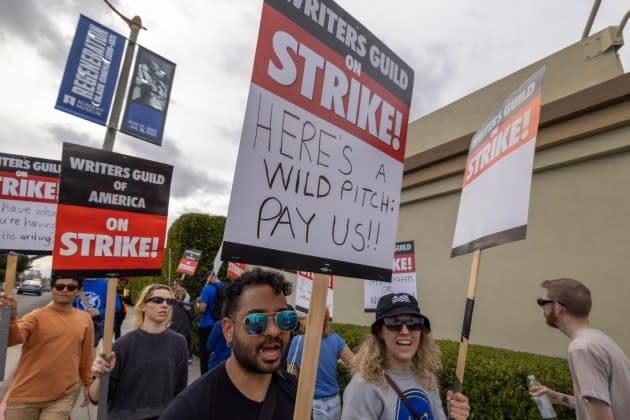Writers Strike: AMPTP Releases New Proposal on AI and Residuals

The Alliance of Motion Picture and Television Producers (AMPTP) has released details of the contract offer presented to the WGA on Aug. 11. The latest proposal includes new details covering key issues in the ongoing writers strike including AI, writers room minimums, and viewership data.
The document outlining the proposals was released after guild leadership and CEOs met on Tuesday night, according to Variety. The WGA Negotiating Committee has since responded to the leaked proposal, saying it “failed to sufficiently protect writers from the existential threats that caused us to strike in the first place.”
More from Rolling Stone
SAG Clarifies What Movie and TV Shoots Will Be Permitted During Strike
Emmy Awards Pushed to January 2024 as Hollywood Strikes Continue
“Our priority is to end the strike so that valued members of the creative community can return to what they do best and to end the hardships that so many people and businesses that service the industry are experiencing. We have come to the table with an offer that meets the priority concerns the writers have expressed. We are deeply committed to ending the strike and are hopeful that the WGA will work toward the same resolution,” said Carol Lombardini, president of AMPTP, said in a statement.
AMPTP’s new proposal bans written material produced by generative AI software from being considered “literary material” or “source material,” and includes guarantees that writers’ “compensation, credit and separated rights will not be affected by the use of GAI-produced material.”
“For example, if the Company gives a writer a GAI-produced screenplay and asks the writer to rewrite it, the writer will receive the fee for a screenplay with no assigned material and not a rewrite,” the AMPTP document states. “Or, if the Company gives a writer a GAI-produced story as the basis for a teleplay, the writer will receive the story and teleplay rate.”
The AMPTP is also offering the WGA increases to 5 percent in wage rates in the first year of the contract, 4 percent in the second year, and 3.5 percent in the third year, consistent with what the Directors Guild of America negotiated earlier this year.
Streaming services are also offering to make viewership data available to the WGA in the form of “quarterly confidential reports” that will include the total amount of hours viewed per streaming project. The data would “enable the WGA to develop proposals to restructure the current SVOD [Subscription Video On Demand] residual regime in the future.”
The AMPTP’s proposal also offers SVOD total worldwide residual boosts from $72,067 to $87,546 per episode for 3 exhibition years, while the residual would increase to $156,854 from $124,615 over 10 exhibition years.
As for writers room minimums, studios are offering to give showrunners “at least two mid-level writers to be assigned to production who are each guaranteed at least 20 weeks of employment (unless the production period is shorter).”
Following the release of the AMPTP statement, the WGA responded with a public letter to its members, saying they accepted a meeting with Bob Iger, Donna Langley, Ted Sarandos, David Zaslav, and Carol Lombardini “in good faith.” They added the meeting took place “in hopes that the companies were serious about getting the industry back to work.”
“Instead, on the 113th day of the strike – and while SAG-AFTRA is walking the picket lines by our side – we were met with a lecture about how good their single and only counteroffer was,” the WGA Negotiating Committee wrote. “We explained all the ways in which their counter’s limitations and loopholes and omissions failed to sufficiently protect writers from the existential threats that caused us to strike in the first place. We told them that a strike has a price, and that price is an answer to all – and not just some – of the problems they have created in the business.”
They added, “But this wasn’t a meeting to make a deal. This was a meeting to get us to cave, which is why, not twenty minutes after we left the meeting, the AMPTP released its summary of their proposals. This was the companies’ plan from the beginning – not to bargain, but to jam us. It is their only strategy – to bet that we will turn on each other.”
The WGA Negotiating Committee confirmed they will release more information about the negotiations this week.
The WGA began its strike on May 2, forcing many major productions, including late-night talk shows and awards presentations, to cease operations. Prior to the strike, talks between the WGA and AMPTP stalled after they failed to reach an agreement about a number of issues, including viewership-based residuals, minimum staffing levels, and regulation of the use of AI.
After the union expressed earlier this month that it intended to resume negotiations with major studios and streaming services, the WGA issued a statement to its members: “Our committee returns to the bargaining table ready to make a fair deal, knowing the unified WGA membership stands behind us and buoyed by the ongoing support of our union allies.”
This story was updated with the WGA’s statement on Aug. 23 at 3:30 am ET
Best of Rolling Stone
